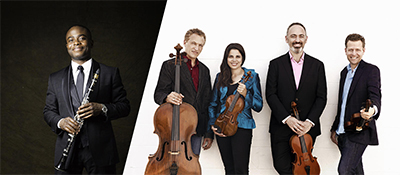by Timothy Robson

In addition to Holloway, the quartet members are Simin Ganatra and Austin Hartman, violins, and Brandon Vamos, cello. The audience was intentionally limited to 300, with strict social distancing and required face masks. There was a muted but celebratory atmosphere in the hall as friends greeted each other. It was the first in-person concert I have attended in fourteen months, and despite the safety oddities required, it affirmed that there is nothing like live music.
Following introductory remarks by Tuesday Musical officials, the 75-minute concert spanned three works, without intermission. The variety of styles, with music by Jaoquin Turina, James Lee III, and Brahms, was eclectic.
Turina’s string quartet La oración del Torero, Op. 34 (“The prayer of the toreador”) is in five segments, without significant pause between most of them. The music has that difficult-to-describe “Spanish sound,” like those of his contemporaries, Albéniz and Granados, but also shows the influence of the French impressionists of the early 20th century. The opening is jittery and unsettled, but later there are lush harmonies and a serene ending. Each section includes a Spanish dance, but that was not much help in distinguishing the sections. The Pacifica Quartet’s refined sound was somewhat remote in the large, half-empty hall, but they played with tight ensemble, capturing the ever-shifting moods in the music.
American composer James Lee III’s Quintet for Clarinet and String Quartet (2018) is a work in four movements with descriptive titles relating to the concept of identity in African American and Native American communities, and the reality of having one’s cultural identity determined by others without individual choice.
Lee’s quintet is influenced by Native American music and works by American Black composers Nathaniel Dett and William Dawson. Anthony McGill, principal clarinet of the New York Philharmonic, and one of the leading clarinet virtuosos of our day, played a significant role in defining the characteristics of each movement. He created flights of fanciful arpeggios and ornaments, and also underlined the rhythmic nature of the Native American dances used in the movements.
Each has a cultural reference as a title. After “Forgotten Emblems” and “Awashoha” (a playful scherzo), “Alas, my identity” cast McGill as protagonist in a complex, emotional recitative accompanied by the strings, describing the arbitrary abuses of cultural reassignment. The finale, “Celebrated emblems,” was joyous, with stomping Native American dance rhythms in groups of five notes, and McGill soaring seamlessly from bottom to top of his range. This was the first live performance of this quintet, which should be considered a significant new work in the repertoire.
After the dramatic impact of Lee’s quintet, it was a joy to be awash in the romantic warmth of Brahms’ Clarinet Quintet in b. This late work was the high point of this concert, and showed the composer at the height of his compositional genius. The playing was refined, with subtle ebb and flow of phrasing and consistency of balance. Anthony McGill was masterful in the variety of sounds that he coaxed from his instrument. He played with perfect pitch and even tone throughout the instrument’s range, and was always alert to his collaboration with the quartet. The second-movement adagio was especially lyrical and wistful, with the clarinet definitely taking a solo role.
This concert would have been outstanding under any circumstances. That it was a rare in-person performance during the pandemic made it especially memorable.
Published on ClevelandClassical.com May 12, 2021.
Click herefor a printable copy of this article



